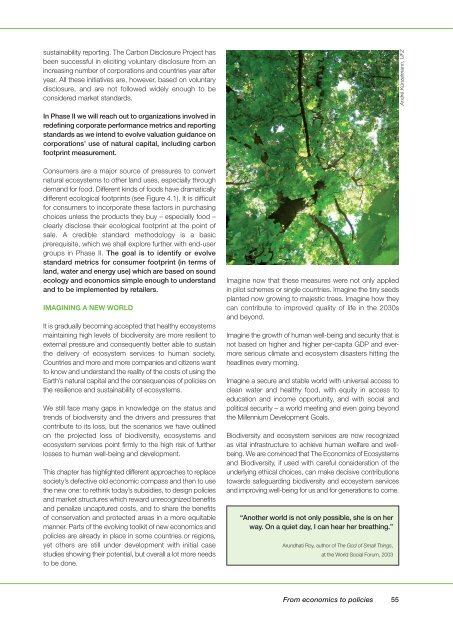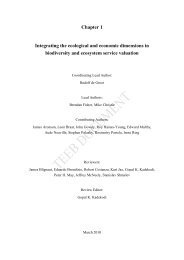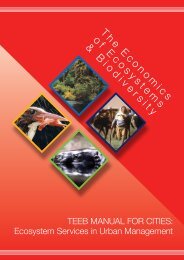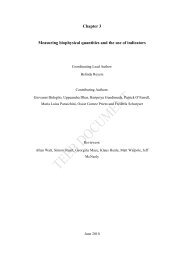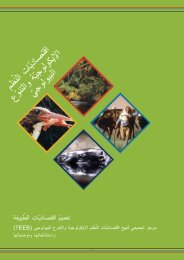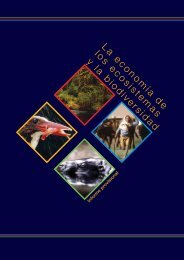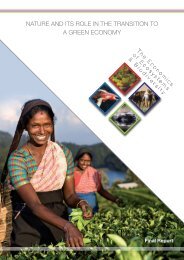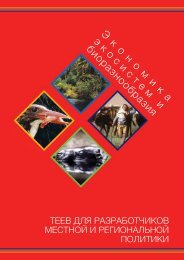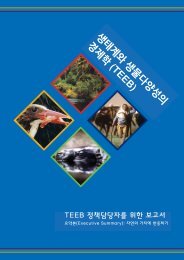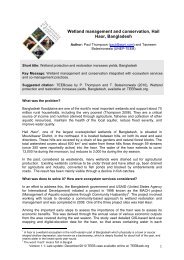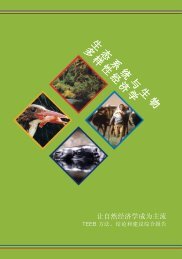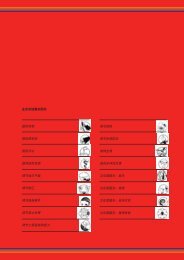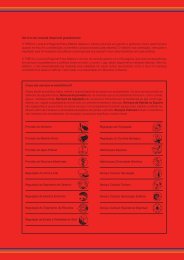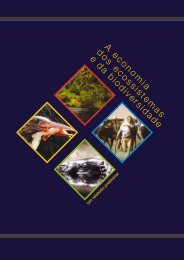Interim Report - TEEB
Interim Report - TEEB
Interim Report - TEEB
Create successful ePaper yourself
Turn your PDF publications into a flip-book with our unique Google optimized e-Paper software.
sustainability reporting. The Carbon Disclosure Project has<br />
been successful in eliciting voluntary disclosure from an<br />
increasing number of corporations and countries year after<br />
year. All these initiatives are, however, based on voluntary<br />
disclosure, and are not followed widely enough to be<br />
considered market standards.<br />
André Künzelmann, UFZ<br />
In Phase II we will reach out to organizations involved in<br />
redefining corporate performance metrics and reporting<br />
standards as we intend to evolve valuation guidance on<br />
corporations’ use of natural capital, including carbon<br />
footprint measurement.<br />
Consumers are a major source of pressures to convert<br />
natural ecosystems to other land uses, especially through<br />
demand for food. Different kinds of foods have dramatically<br />
different ecological footprints (see Figure 4.1). It is difficult<br />
for consumers to incorporate these factors in purchasing<br />
choices unless the products they buy – especially food –<br />
clearly disclose their ecological footprint at the point of<br />
sale. A credible standard methodology is a basic<br />
prerequisite, which we shall explore further with end-user<br />
groups in Phase II. The goal is to identify or evolve<br />
standard metrics for consumer footprint (in terms of<br />
land, water and energy use) which are based on sound<br />
ecology and economics simple enough to understand<br />
and to be implemented by retailers.<br />
IMAGINING A NEW WORLD<br />
It is gradually becoming accepted that healthy ecosystems<br />
maintaining high levels of biodiversity are more resilient to<br />
external pressure and consequently better able to sustain<br />
the delivery of ecosystem services to human society.<br />
Countries and more and more companies and citizens want<br />
to know and understand the reality of the costs of using the<br />
Earth’s natural capital and the consequences of policies on<br />
the resilience and sustainability of ecosystems.<br />
We still face many gaps in knowledge on the status and<br />
trends of biodiversity and the drivers and pressures that<br />
contribute to its loss, but the scenarios we have outlined<br />
on the projected loss of biodiversity, ecosystems and<br />
ecosystem services point firmly to the high risk of further<br />
losses to human well-being and development.<br />
This chapter has highlighted different approaches to replace<br />
society’s defective old economic compass and then to use<br />
the new one: to rethink today’s subsidies, to design policies<br />
and market structures which reward unrecognized benefits<br />
and penalize uncaptured costs, and to share the benefits<br />
of conservation and protected areas in a more equitable<br />
manner. Parts of the evolving toolkit of new economics and<br />
policies are already in place in some countries or regions,<br />
yet others are still under development with initial case<br />
studies showing their potential, but overall a lot more needs<br />
to be done.<br />
Imagine now that these measures were not only applied<br />
in pilot schemes or single countries. Imagine the tiny seeds<br />
planted now growing to majestic trees. Imagine how they<br />
can contribute to improved quality of life in the 2030s<br />
and beyond.<br />
Imagine the growth of human well-being and security that is<br />
not based on higher and higher per-capita GDP and evermore<br />
serious climate and ecosystem disasters hitting the<br />
headlines every morning.<br />
Imagine a secure and stable world with universal access to<br />
clean water and healthy food, with equity in access to<br />
education and income opportunity, and with social and<br />
political security – a world meeting and even going beyond<br />
the Millennium Development Goals.<br />
Biodiversity and ecosystem services are now recognized<br />
as vital infrastructure to achieve human welfare and wellbeing.<br />
We are convinced that The Economics of Ecosystems<br />
and Biodiversity, if used with careful consideration of the<br />
underlying ethical choices, can make decisive contributions<br />
towards safeguarding biodiversity and ecosystem services<br />
and improving well-being for us and for generations to come.<br />
“Another world is not only possible, she is on her<br />
way. On a quiet day, I can hear her breathing.”<br />
Arundhati Roy, author of The God of Small Things,<br />
at the World Social Forum, 2003<br />
From economics to policies<br />
55


